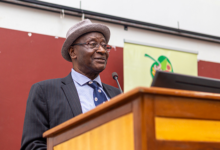
The Social Security and National Insurance Trust (SSNIT) spends a total of GH¢ 200 million on the payment of benefits to more than 200,000 pensioners every month.
The payment ranges between GH¢300.00 and GH¢ 55,899.00 per person, depending on the contribution made by the individual.
Deputy Director General of SSNIT in-charge of finance and administration, Mr Michael Addo, announced these at a meeting between his outfit and the Trades Union Congress (TUC) at Wa on Thursday.
The meeting was organised to enable SSNIT to educate members of the TUC on the computation of their benefits.
“Aside this figure, we pay for invalidity pensions to persons who are subscribers to the insurance scheme but have been rendered incapable or disabled by a misfortune after 12 months of contribution. A little over GH¢1 million is spent on such payments each month,” Mr Addo explained.
He said “SSNIT is the most generous insurance scheme you can ever have, as we pay more than the minimum wage and always ensure that our minimum wage is higher than the national labour minimum wage.”
Mr Addo said there was no myth surrounding the computation of the benefits due the pensioners, adding that what pensions paid were the direct reflection of the salaries on which contributions were made.
He explained that “71 per cent of pensioners are contributing on GH¢1,800.00 or less, 25 per cent are contributing on a salary of GH¢400.00 or less, 50 per cent contribute on a salary of GH¢1,000.00 or less, whereas 4 per cent contribute on a salary of GH¢5,000.00 or more.”
Chief Executive Officer for the National Pensions and Regulatory Authority (NPRA), Mr Hayford Attah Krufi, said “the recent impasse between SSNIT and organised Labour and the determination of NPRA on the issues has necessitated some directives to SSNIT, and it included meetings between SSNIT and organised labour on the operational and transparency of SSNIT.
He noted that SSNIT had been tasked to send statements to its clients on their contributions, at least three months to the close of every year, to remind them of how their pension fund was doing, and also prepare their minds towards retirement.
Commenting on the issue of low salaries, which had led to low contributions, the Deputy General Secretary for the TUC, Mr Joshua Ansah, hinted that the constant involvement of the International Monetary Fund (IMF), in the affairs of the nation’s economy, had led to the low salary rates among workers in Ghana.
He said the IMF restricted the payment of higher salaries to save the government from spending more.
Mr Ansah said “well, now, it appears we are finally leaving IMF so we will monitor proceedings and see if anything good would come out of this for workers. We have started negotiating for increment of salaries for 2020 for workers.”
He urged workers to upgrade this skills and knowledge to ensure promotions and expand their career knowledge and experience
LYDIA DARLINGTON FORDJOUR, WA






